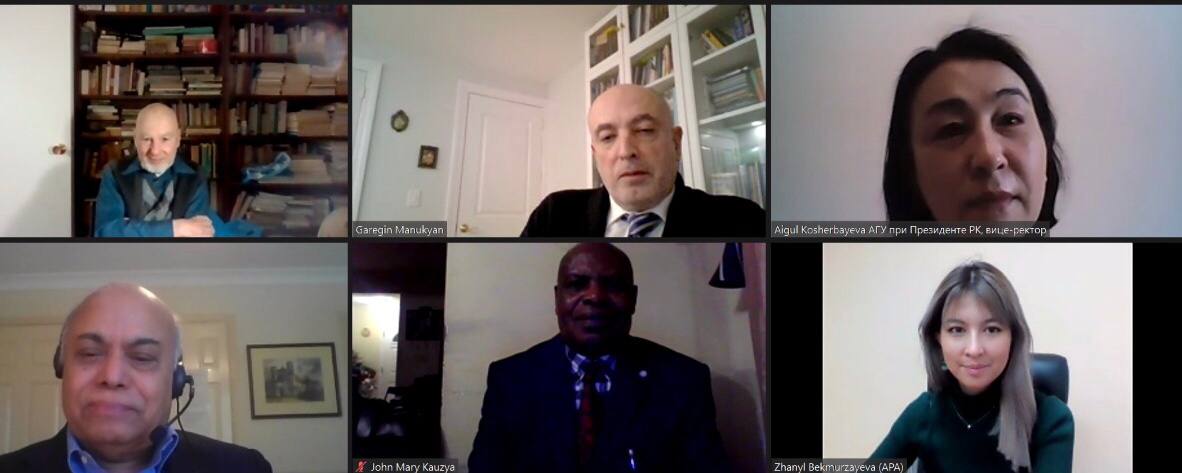Today on 15th of January 2021 jointly organized a Webinar by UNDESA and the Academy of Public Administration under the President of the Republic of Kazakhstan on the occasion of the Development Day.
The purpose of the webinar was to raise the awareness of the participants in the United Nations Programme on Public Administration and the role it plays in the implementation of the 2030 Agenda. Also, participants will be sensitized about criticality of citizens engagement in the implementation of SDGs.
The moderator of the webinar was Vice-Rector for Strategic Development, Research and International Partnership of the Academy – Dr. Aigul Kosherbaeva. The speakers were:
Dr. John-Mary Kauzya, Chief of Public Service Innovation Branch in DPIDG/UNDESA.
Dr. Demetrios Argyriades, Doctor honoris causa of both the University of Athens and the Panteios University of Political Science. In the past 27 years, he served as a consultant to the E.U., the Bank of Greece, the South African Government, UNDESA, UNDP and other international organizations on public service reform, ethics and democratic governance.
Pr. M. Adil Khan, Professor of Development Practice at the School of Social Science, University of Queensland, Brisbane (Australia) and former Chief of Socio-Economic Governance and Management Branch of the United Nations Department of Economic and Social Affairs (UNDESA), New York.
Mr. Garegin Manukyan, Senior Governance and Public Administration Officer, PSIB/DPIDG/UNDESA.
Dr. J.Kauzya delivered a welcoming speech, expressing the hope that at the end of the webinar, the invited participants and guests will have a better understanding of the role of civil society and the necessary conditions underlying the important interaction between the public sector, voluntary organizations and the private sector itself.
As Mr. G. Manukyan noted in his speech on the contribution of the United Nations Program on Public Administration to sustainable development: “In the coming years, Public Administration will remain the main instrument of the state for defining policy, implementing programmes and ensuring security, protection and quality services for all citizens. Therefore, I am confident that cooperation between the Academy and DPIDG/UNDESA is doomed to a long-term productive case”.
Mr. Adil Khan spoke on the topic “Citizens Engagement for SDGs”: “The SDGs that make up the 2030 Agenda are global goals, but their implementation includes both global and national cooperation. However, the most importantly, building the capacity of national and local institutions contributing to the Agenda implementation. Finding ways, means, institutional capacity and skills of civil servants to engage citizens is key to building a prosperous, equitable and sustainable society”.
In conclusion, Mr. D. Argyriades gave a presentation on the topic “Public Administration: before pandemic and after”: “By insisting on the achievement of the SDGs, one can only express the hope that humanity in general and our countries, in particular, will choose a model of public administration and a service that meets the needs of people and the needs of the time. Considering our experience in tackling the pandemic, we may have to go back to the post-World War II Reconstruction era: rebuild our institutions, strengthen the rule of law, and reaffirm the values of our civil service profession. We need to focus on the people, communities and the end-users of our services”.
By the end of the webinar, the speakers answered all the questions asked, and the discussion platform itself provided an opportunity to exchange ideas on the main topics of the event.

